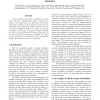Free Online Productivity Tools
i2Speak
i2Symbol
i2OCR
iTex2Img
iWeb2Print
iWeb2Shot
i2Type
iPdf2Split
iPdf2Merge
i2Bopomofo
i2Arabic
i2Style
i2Image
i2PDF
iLatex2Rtf
Sci2ools
ISQED
2007
IEEE
2007
IEEE
Intelligent Random Vector Generator Based on Probability Analysis of Circuit Structure
Design verification has become a bottleneck of modern designs. Recently, simulation-based random verification has attracted a lot of interests due to its effectiveness in uncovering obscure bugs. Designers are often required to provide the input probabilities while conducting the random verification. However, it is extremely difficult for designers to provide accurate input probabilities. In this paper, we propose an iterative algorithm that derives good input probabilities so that the design intent can be exercised effectively for functional verification. We conduct extensive experiments on both benchmark circuit and industrial designs. The experimental results are very promising.
Hardware | Input Probabilities | ISQED 2007 | Random Verification | Simulation-based Random Verification |
Related Content
| Added | 04 Jun 2010 |
| Updated | 04 Jun 2010 |
| Type | Conference |
| Year | 2007 |
| Where | ISQED |
| Authors | Yu-Min Kuo, Cheng-Hung Lin, Chun-Yao Wang, Shih-Chieh Chang, Pei-Hsin Ho |
Comments (0)

